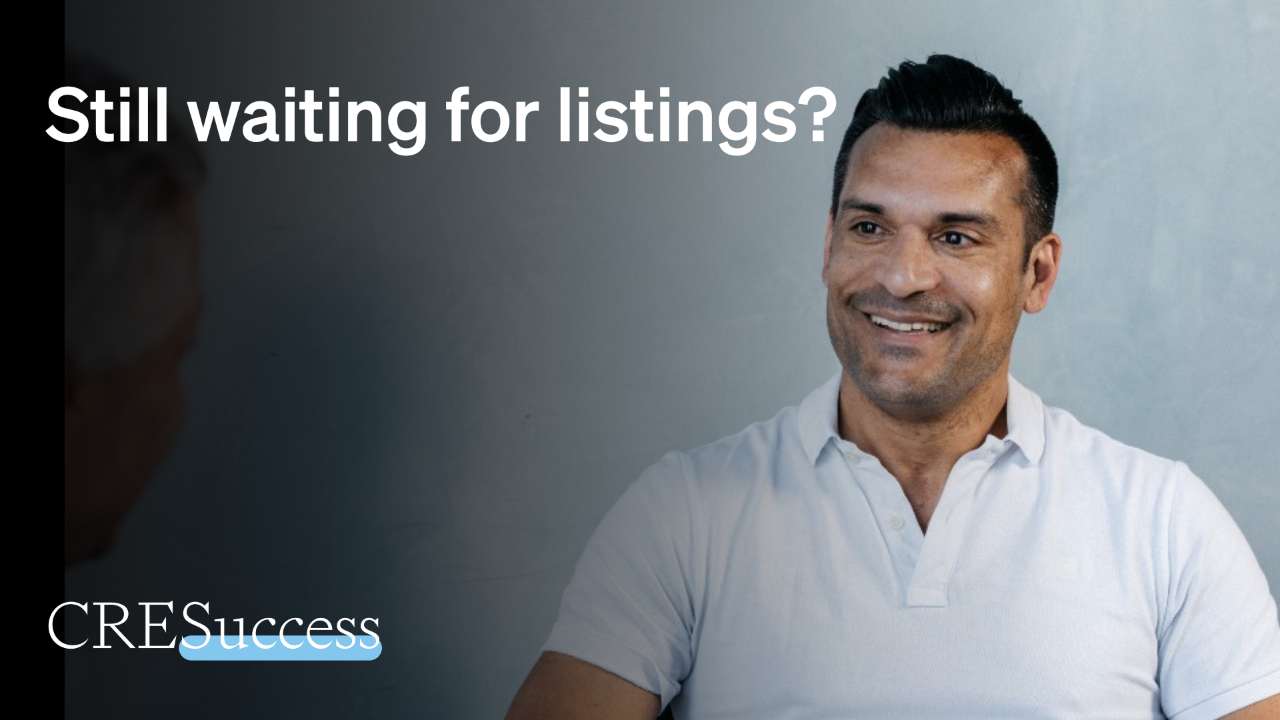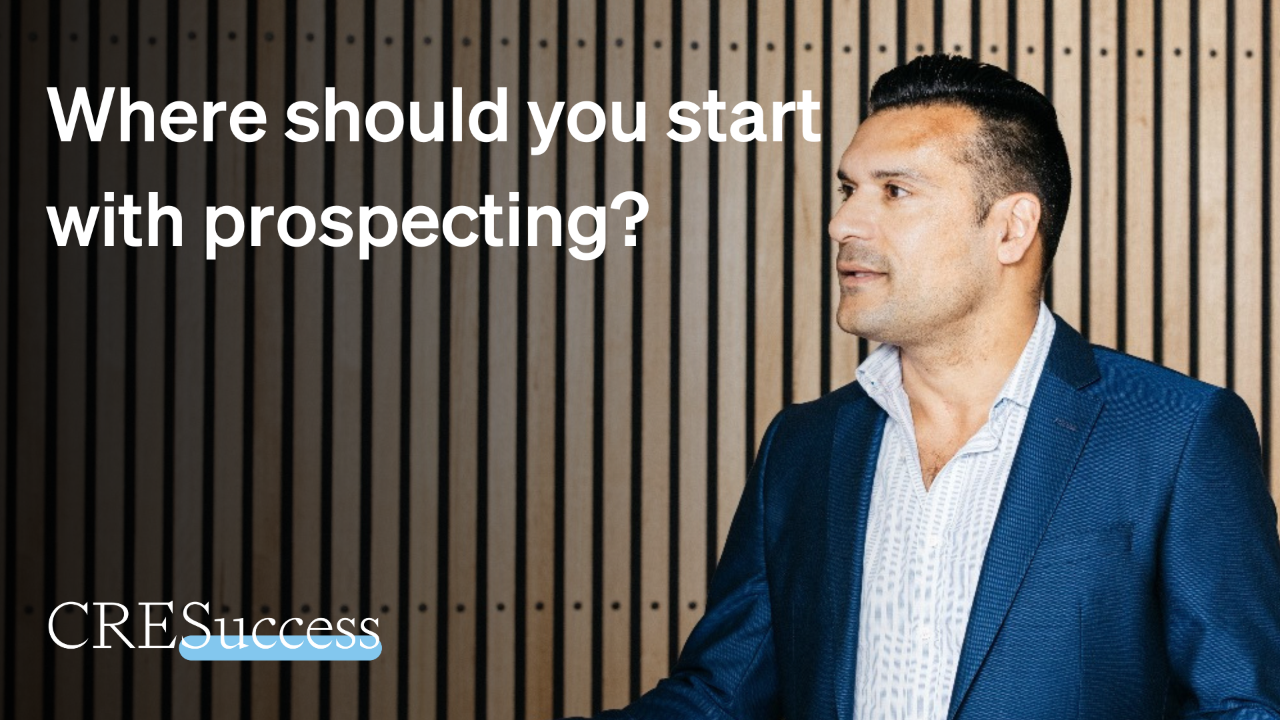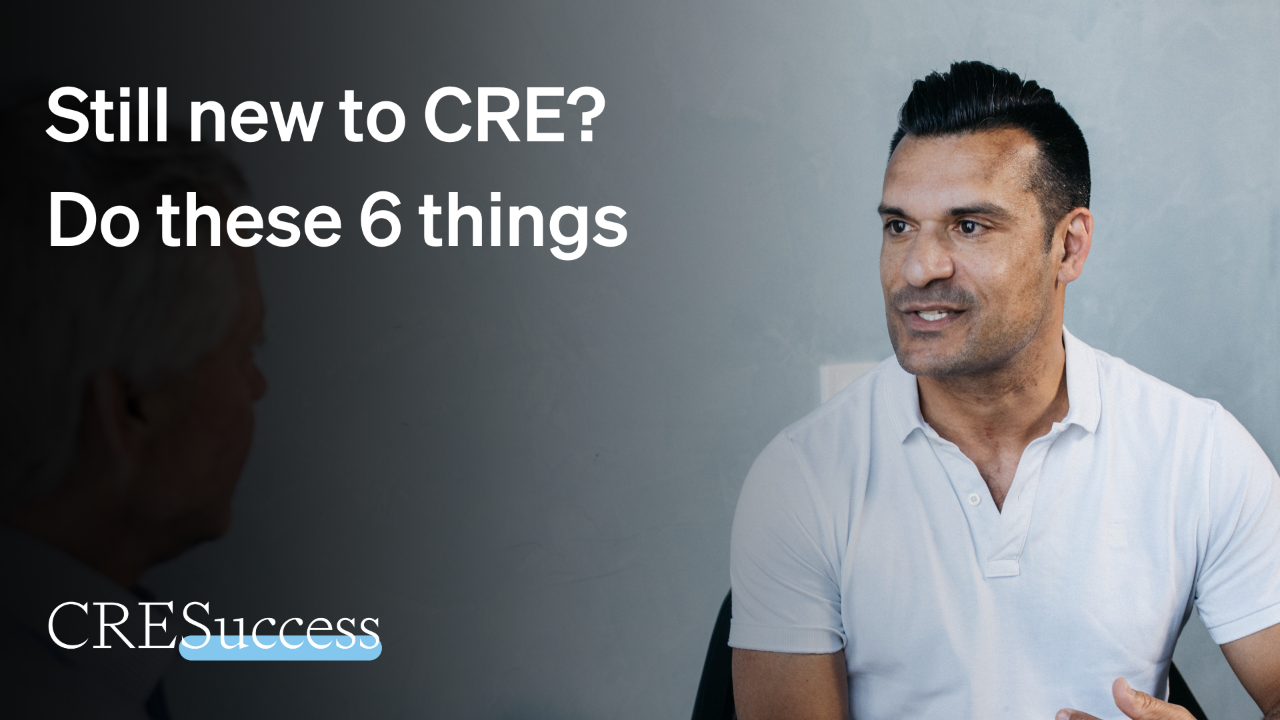What your business needs (and what is doesn’t) in 2024
Dec 06, 2023
As we head into the final stretch of 2023, I can't help but notice the excitement and trepidation in anticipation for what lies ahead in 2024.
Now, I do have a view on this, so next week I’m hosting How Commercial Real Estate Agents Will Win in 2024 – please take a moment to register here if you’d like to join us.
And, as you make your own plans for the new year, I want to give you this little reminder: your business needs strategic focus, but not every task requires your personal touch.
Figure out what truly moves the needle, what can be delegated, and how to deploy resources – including your own time – to achieve optimal results.
For some help with making these assessments, take a listen to episode 168 of Commercial Real Estate Leadership.
Episode transcript:
We're into December. I don't know about you. I'm getting excited that we're coming up to the end of the year.
But I'm also starting to think about all the things that I want to do in 2024, all the things that the business needs.
And you might be thinking about those things too.
But I want to give you a bit of a caution to make sure that you're not over committing to doing so many things that you want to see happen in your business, or at least, that you're not over committing yourself.
Because there are certain things that your business needs, that is true, but not all of them need to be delivered by you.
And in fact, all of the things that you think your business needs in order to achieve the results that you want, may not even need to be implemented in order for you to get those results.
Let's talk about that in today's episode.
Hello, welcome to episode 168 of commercial real estate leadership. I'm your host, Darren Krakowiak.
And I am so happy that you are here. If you've got a commercial real estate business, I want to help you to make it bigger.
And whether you have a commercial real estate business or not, I've got 167 episodes in the back catalogue of this podcast for you to go back and listen to.
There is a treasure trove of resources, content, advice, insights, not only from me, but we've got more than 40 interviews with other experts that you can go back and listen to.
From episode one right through to, well, last week's which was 167. The back catalogue of CRE Success: The Podcast and Commercial Real Estate Leadership is available to listen to now on your favorite podcast player for free.
So I hope that you will check that out and also recommend it to somebody who you think will benefit from the content.
So recently, I delivered a keynote presentation at a commercial real estate symposium.
And at this event, one of the key concepts that I shared was this thing called 'The function funnel'.
And the function funnel is all about elevating people's roles, including your role as a leader to make sure that we are not overpaying for the delivery of certain tasks and outcomes in a business.
Because everyone has their hourly rate, their effective hourly rate.
I've talked about the rule of 2000 hours before in the show, 2000 hours in a work year roughly. If you think about, there's 40 hours in a week and 50 hours in a year that a business is paying people to work.
And that's what they're paying when you take out the 12 public holidays a year. There's roughly 2000 days was you still pay people for their annual leave, right?
So as a business, if we take what people are being paid, we divide that by 2000, we can figure out what their effective hourly rate is.
And as much as possible, we don't want to be overpaying for the work that people are doing.
So if we know what people's effective hourly rate is, and we just, let's say we half it or even divided by four.
There's a great book by a guy named Dan Martell, which is called 'Buy Back Your Time'. And he says well divide it by four.
And if something can be done at a quarter of the price by somebody else, then it should always be done by somebody else, not only in business, but in life.
And as much as possible we want to make sure that we're running our tasks, our things that are being done in a business through the function funnel.
And the function funnel just says that, is this something that we can eliminate? Is this something which we can automate. Is this something which we can outsource? Is it something which we can delegate?
And if we can't do any of those things in that order, it might be something that we still have to do or the person who's currently responsible for it still has to do.
So, to give you an example, something that we might eliminate is the collection of fax numbers, right?
We perhaps don't ask people for their fax number anymore, because it's just not necessary.
In terms of things that we might automate, well, we might automate the first follow up in the collection of arrears.
There might be an automated email or SMS that goes out when people haven't paid their bills when tenants haven't paid their rent.
We might outsource the account function, we might delegate.
Well, there are so many things that you can probably delegate, just think of anything that you have ever asked anyone else who you work with to do.
And then of course, there are things that you just have to do.
And what I wanted to talk about specifically in today's episode, is some of my clients who have been telling me about the things that they want to do.
And I've been saying, "Hang on, do you actually need to be doing all of these things?
Like one of my clients told me recently that they were committing to doing weekly training for their team.
And I said to him, "Weekly training sounds like a lot. Even if it's not all delivered by you."
Weekly training in perpetuity sounds like a lot. How often do we need to train our people? What training do you think they actually need?
Maybe we can create a training calendar, which is just focused on the areas where people need help. And that's going to really move the needle forward.
And as much as possible, I said, "Invite other people to do the training. People inside the business, people outside the business to take the pressure off you to make sure that other people are helping you deliver on this commitment to improve the capability of your team.”
Another one of my clients recently got one of their competitors to come in and speak to their team.
So literally, the principal of another commercial real estate business now he had a relationship with him because they used to work together.
But a competitor, he got to come in and speak to his team about how to be an effective commercial real estate agent.
And what I thought was so great about this was that one, it was outsourcing the trading to somebody else.
But also, my client wasn't worried about this competitor showing him up or being better than him or potentially stealing his stuff because he was so capable in what he was presenting.
But also, the competitor wasn't worried about sharing his best secrets because my client told me that this competitor came in and laid it all out.
Both of them came at this from a perspective of abundance, which I thought was fantastic.
Recently, I used this idea by last month, I had my first for my private clients that I work with one on one.
We invited Mark Sinclair of Pendium Advisory and Kristin Porter of O*NO Legal to come in and do a one-time session for my clients on the valuation of your business from a valuation perspective, from Mark, who's a valuer and rent roll and commercial real estate business broker, and also protecting the value of your business from a legal perspective, which was done by Kristen, who is a lawyer.
And other people do this too, right? My business coach in the program that I'm in for business coaches invited Alex Hormozi to come in and speak to that group.
And Alex Hormozi, if you're not familiar with him, I strongly recommend that you start following his content.
In fact, one of the books that I'm going to recommend in a couple of weeks on our final episode of the year, where we talk about book recommendations is going to be from Alex Hormozi.
He puts out so much great content him and his wife, Leila.
And a few of the key takeaways that I took from that session was that in order to get bigger, we just have to be better. Better always will create bigger. But he also clarified that bigger isn't always better.
When I shared that on LinkedIn, someone said, "Well, what are some of the other key takeaways?" And I'll share the comment that I put on my LinkedIn when that person asked me that now.
One of them that Alex Hormozi said (pardon my French), but this is what he said, "When you do shit, then shit happens." So, action is what leads to results.
Also, leaders have to have a low tolerance for mediocrity.
And I thought that was interesting, because I've always felt like, I can put really high standards on myself. But I don't always want to impose those exceptionally high standards on others.
But I don't think those two things are mutually exclusive. Because what he's saying is, you don't have to expect that everyone is doing things exactly the way they you would do them.
But you should still have really high standards in terms of what you expect from other people.
Because if you have a business with people in it, that aren't of a certain caliber and quality, then your business isn't going to get to where it is you want it to grow, if you have very ambitious expectations for that business.
And the other one that he said, and I hadn't heard him say this in his content before, but then once I heard him say it on this live zoom, then I started hearing it on his YouTube videos.
Funny how you know, someone buys a car, and you start seeing it everywhere, the reticular activating system.
Anyway, the saying was '100 golden BB's, zero silver bullets'.
And what he was saying there is, there's no one thing, there's just a lot of little things that you need to get right in order to get your business to where it is that you want it to go.
So, I guess the takeaway that I want to give you in this episode is that your business does need a lot of things, but perhaps God is very thinks as you think.
Have a think about what are the activities and inputs that are going to really move the needle.
Because one, all of the things that you think it needs, it probably doesn't need all of them. But two, many of the things that you think the business needs does not need to be delivered by you.
Decide what it needs, how it's going to get it and then deploy the resources that you have at your disposal to make sure that the business is getting those things.
And to get better at one more time, you can leverage this strategy that is giving people in your team, people your work with what they need by recommending that they come to our new session, which is happening 1 week after this podcast drops.
It's called 'How commercial real estate agents will win in 2024'.
It's a 45-minute session, so no fluff, all value being delivered, where we're going to tell you the top four trends to look out for in commercial real estate in 2024, as well as the most effective strategies to deal with them.
You're going to get crystal clear on what you need to achieve next year in this session, and will also help you commit to the actions.
I just told you; actions are what's important, that are going to be required to get the results that you are after.
And what this means is that you're going to be able to take a relaxing break at the end of the year, and then come back completely focused and motivated with a plan to win in 2024.
So, as I said, it's only a 45-minute session. It’s not a huge commitment of time.
We will be having Q&A at the end and we ask that you if you do attend, please actively participate so everyone else can get the benefit of what is going on in the capped number of participants who were there which is 100.
So, if you want to attend, you can go to cresuccess.co/2024 to reserve your free spot.
That is our episode for today. Thank you so much for being there. Thank you for listening, and I will speak to you soon.








